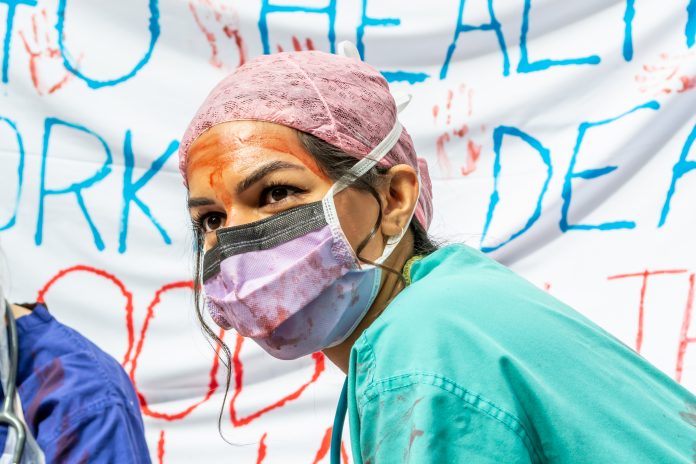
After months of COVID strain, the psychological impact on NHS staff takes shape as a shadow pandemic – today (8 June), a Health Select Committee report finds that NHS “burnout is widespread reality”
The World Health Organization (WHO) definition of workplace burnout is: “a syndrome conceptualized as resulting from chronic workplace stress that has not been successfully managed. It is characterized by three dimensions: feelings of energy depletion or exhaustion; increased mental distance from one’s job, or feelings of negativism or cynicism related to one’s job; and reduced professional efficacy.”
How did the pandemic impact NHS staff?
At the time of writing, over 130,000 people are recorded as dead from COVD-19 in the UK. A further 4.5 million have been documented as infected throughout the course of the pandemic. This number is not definite, as many people will have been infected without knowing it.
In November, 2020, we reported that the pandemic was disproportionately impacting minority ethnic healthcare staff. A study published in The Lancet found that workplace experience for BAME workers is an invisible factor in virus infection rates.
While a white doctor can feel more able to speak out against inadequate PPE, a BAME doctor has less freedom – to risk bringing negative attention to themselves could limit their ascension in future. In a survey, 33% of white doctors felt pressured to work with PPE that would not protect them during a close-contact medical procedure, whereas 64% of BAME doctors felt that pressure.
The Royal College of Psychiatrists conducted regular surveys during the pandemic. In May 2020, over half of its members surveyed said that their wellbeing had worsened during the crisis, with the wellbeing of people from BAME groups disproportionately impacted.
After that month, thousands of NHS workers had their annual leave for winter retracted. Infection levels and hospitalisations were rising rapidly. In November, there were 11,621 recorded COVID deaths. By January, the case rate doubled from roughly 500,000 to over one million. In the first month of 2021, 32,049 people died from the virus.
The looming mental health crisis?
Now, in 2021, many healthcare workers across the NHS are experiencing levels of burnout that make it hard to work or necessary to switch jobs. In the US, studies found that one-fifth of A&E staff were at risk of PTSD from prolonged exposure to the stresses of life and death decision-making – with little rest.
The report states that: “Burnout is a widespread reality in today’s NHS and has negative consequences for the mental health of individual staff, impacting on their colleagues and the patients and service users they care for. There are many causes of burnout, but chronic excessive workload is a key driver and must be tackled as a priority. This will not happen until the service has the right number of people, with the right mix of skills across both the
NHS and care system.”
The Nuffield Trust reported that NHS staff absence rates in April 2020 were the highest ever recorded.
A lead cancer nurse commented: “We’ve all got that Covid fatigue. We’re exhausted by the way we’re living and working. And it’s really difficult. The thing is, we’re coming up to winter, we’ve got to step up to the mark again. And it’s whether we have the resilience to deal with that.
“And, of course, we’ll have to because there’s just no more capacity and no more staff to handle it.”
Among the recommendations made by the Health Select Committee are that a new system of checking on staff welfare is created, and implemented across both health and social care sectors. Currently, there are 1.6 million people working in social care with no way to voice their mental health status. Another recommendation touches on the lack of adequate racial representation at decision-making levels in Integrated Care Systems (ICSs), asking for new boards to represent the populations that are using these services. While the UK has a 10-year plan for the NHS, there is currently no 10 year or long-term funding plan for social care.
COVID forced thousands to take on unpaid caring roles, for fear of infecting their loved ones with the virus in accessing any external help. According to an investigation by The Kings’ Fund, the sector would collapse without unpaid labour to support it.
The Government response to this report and all recommendations is due by 8 August, 2021.
The full report is available to read here.
Editor's Recommended Articles
-
Must Read >> UK Government to give NHS workers a pay cut in 2021














